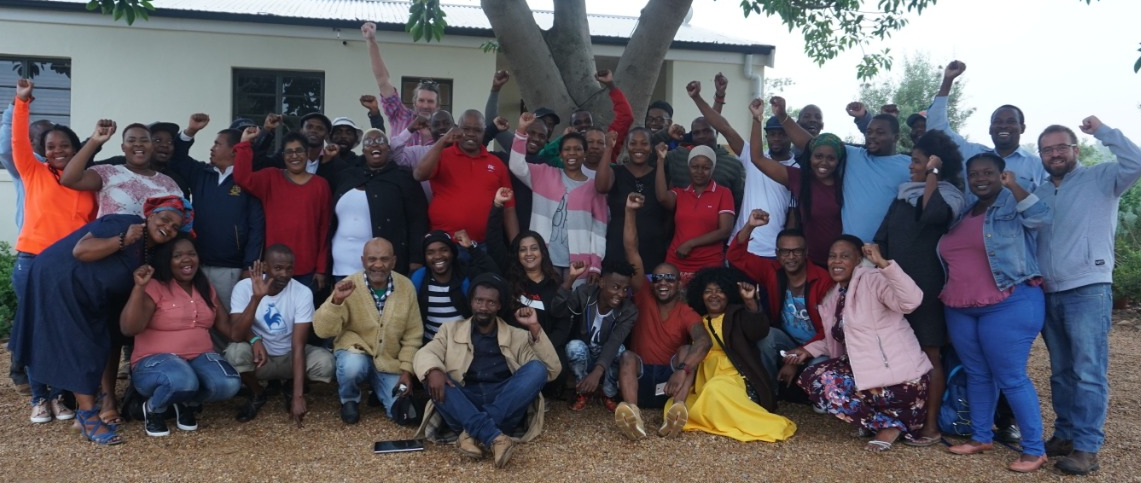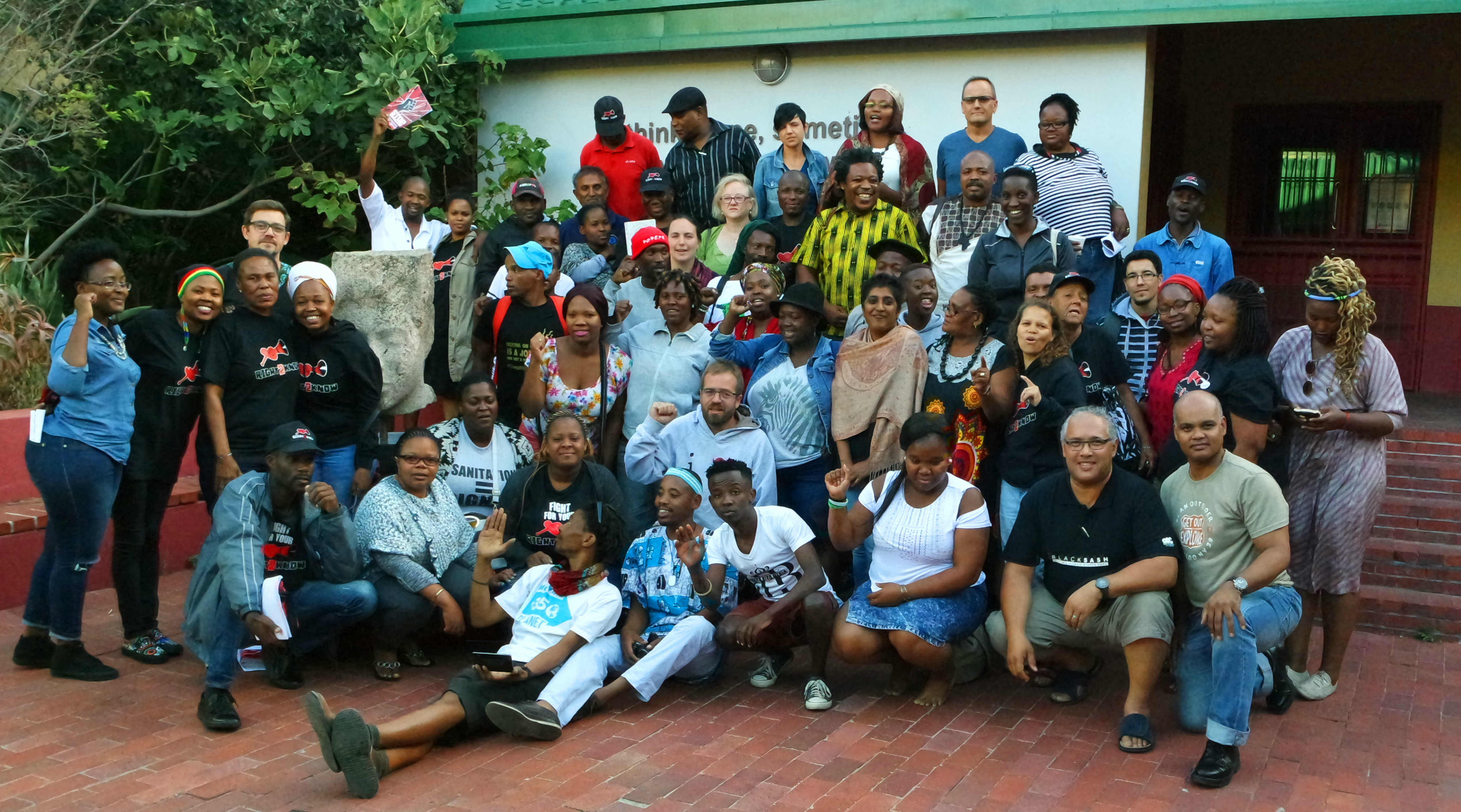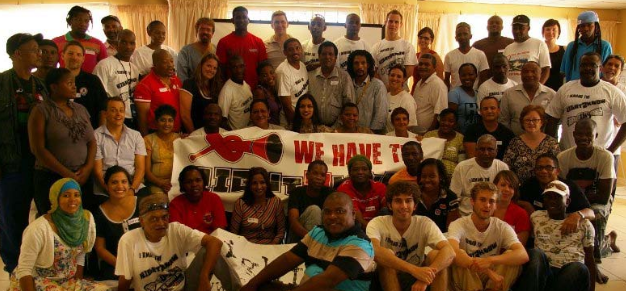Right2Know 2016 National Summit Resolutions
The Right2Know Campaign held its sixth National Summit in Gelnwood, Durban, from 26 – 28 February 2016. The Summit constituted of delegates elected at Provincial Summits in Gauteng, KwaZulu-Natal, and the Western Cape, as well as members of the outgoing National Working Group and a number of observers from supporting organisations .
Delegates assessed the progress made since the fifth National Summit (in Feb 2015) and the challenges and opportunities facing the campaign in the coming year .
Delegates then developed and adopted the following resolutions and elected a 2015/16 National Working Group.
DOWNLOAD THE FULL SUMMIT REPORT HERE.
Summit Resolutions
2.1. Secrecy and Surveillance
Noting the increasing reach of securocrats in closing democratic spaces, and noting that these issues are central to the challenges facing activist struggles across South Africa, R2K resolves to make the following interventions:
- Adopt ‘secrecy and surveillance’ as the popular term for this leg of the campaign;
- Prioritize the building of a popular campaign against surveillance of activists.
2.1.1 Surveillance
The campaign against surveillance will include:
- Engaging and pressuring surveillance watchdogs, including the Inspector General of Intelligence and the RICA Judge, and campaigning for the appointment of an independent and credible Inspector General of Intelligence;
- Doing Popular Education on how surveillance affects community activists, and giving workshops on surveillance self-defense;
- Launching a joint call against mass surveillance, with wide endorsement, together with public action by PWGs;
- Popularizing stories and materials from “Big Brother Exposed” and giving activists a platform to tell their stories of surveillance;
- Targeting the private sector and communication service providers such as MTN, Vodacom, Cell C and Telkom to demand they protect us against surveillance;
- Linking these issues to our continued work against the draft Cybercrimes Bill.
2.1.2 Corporate and political secrecy
The campaign against secret deals and political corruption must highlight the issue of secret donations to political parties, including:
- Identifying local struggles against political secrecy and drawing links between corruption and service delivery issues;
- Using Local Government Elections to raise awareness of how companies and rich individuals can ‘buy’ the support of political parties through secret funding, undermining the public’s right to know and our democracy;
- Using PAIA requests, open letters and other campaigning tools to demand transparency from political parties and target private-sector donors to reveal their donations;
- Engaging allies and stakeholders to put this issue at the centre of their work, especially Corruption Watch;
- Engaging whistleblowers within political parties to raise concerns about this as part of the internal democracy of their organisations;
- Supporting My Vote Counts to drive this work.
2.1.3 Additional campaign issues
- Deepening R2K’s focus on the non-payment of tax and the flow of money out of South Africa by the very wealthiest corporations and individuals. R2K must delegate a team to take this forward and propose further action;
- Preparing for the release of the report of the Seriti Commission on the Arms Deal. This will include highlighting how the Commission failed to expose the secrecy and corruption of the Deal.
2.2. Access to Information
Noting that our priority in relation to Access to Information lies in sustained local solidarity and support, R2K resolves to make the following interventions:
2.2.1 Sustained local solidarity and support
- Use popular education and mobilisation to deepen understandings of the tools and importance of access to information as the bedrock of all local struggles;
- Continue to develop and deepen our “basket” of strategies beyond the Promotion of Access to Information Act (PAIA) to also include the Promotion of Administrative Justice Act (PAJA);
- This will be done through small provincial focus groups whose capacity to lead on access to information issues will be strengthened.
2.2.2 Local government & 2016 Local Government Elections
- Root our work in the right to public participation;
- Campaign for open meetings and open processes, with specific attention to local tender processes and ward committee processes;
- Campaign for free Wi-Fi for all;
- Campaign for transparency of political party finances;
2.2.3 At a national level
- Working with allies in the environmental justice sector, we demand transparency in the Nuclear Deal. Our actions will include a greater emphasis on popular education at a grassroots level;
- We must demand the appointment of an independent champion (the equivalent of the Information Regulator as the new access to information watchdog), and demand that this body has a sufficient mandate to protect our environmental rights;
- We must support the campaign for the release of all apartheid secret records;
- We must increase our focus on accessing private sector information and identifying specific struggles and demands for information from private sector;
- We must campaign for the amendment and strengthening of PAIA to promote the right to know and ensure access to information;
- We must engage critically on the implications of the proposed Procurement Bill and the e-tender portal that will become operational this year;
- R2K must support the #HandsOffOurGrants campaign nationally.
2.3. Media Freedom & Diversity
R2K resolves to make the following interventions in 2016/7:
2.3.1 Regional Solidarity:
- R2K will continue to support regional allies’ campaigns for media freedom, in the interest of a free and independent media sector in Africa.
2.3.2 Digital Migration
- R2K will continue to push for all set-top boxes to be made free and will continue to oppose means testing;
- R2K will partner with Corruption Watch and investigative journalists to monitor the roll-out of Digital TV for corruption and malpractice, including in the manufacture of the set-top boxes;
- R2K will continue to organize popular education and round tables with communities to build understanding of Digital TV issues and to better understand the grassroots impact of Digital TV and digital migration;
- R2K will continue to campaign for high quality, locally produced content to be provided free-to-air after digital migration happens.
2.3.3 Channel Free – Social Justice TV Channel
- R2K will continue with a consultation process with various organisations and an endorsement drive for Channel Free, the proposed social justice TV channel;
- We undertake to resolve outstanding matters of governance and funding for Channel Free;
- R2K will ensure that R2K members, community organisations and activists continue to have access to participate in the setting up of the Social Justice channel;
- R2K will raise awareness of the planned Channel Free as part of R2K’s Digital TV popular education process.
2.3.4 Community Media
In relation to community media, R2K resolves to:
- Strengthen partnerships with community media and the National Community Radio Forum (NCRF);
- Build on connections and relationships between R2K and community media workers established at the 2015 Media Freedom and Diversity summits;
- Identify and target key community media outlets in each region and work closely with these to build solidarity with the community media sector and spread awareness of R2K issues to their audiences.
2.3.5 Media Freedom
In relation to media freedom, R2K resolves to:
- Continue to campaign for free, independent and diverse media, including, and especially, in the community media space;
- Respond to legislative and regulatory threats, including the Secrecy Bill, the Broadcast Amendment Bill, and the proposed Media Appeals Tribunal;
- Engage on the Department of Communications’ proposed media transformation discussion document;
- Campaign for the right to film and photograph the police and ensure the rights of ordinary people and citizen journalists to record the police is protected.
2.3.6 Internet Freedom (#HandsOffOurInternet!)
In relation to internet freedom, R2K resolves to:
- Campaign for a free and open internet;
- Fight back against attempts to censor the internet. This includes opposing the Regulations and Amendment legislation proposed by the Film and Publications Board and the draft Cybercrimes Bill.
2.4. Access to Telecoms
In relation to Access to Telecoms, R2K resolves to:
- Reinvigorate the Vula’ma Connexion campaign by advocating against expiring data and airtime at the expense of consumers;
- Promote community-owned telecommunications (the Zenzeleni model) as a way of connecting poor rural communities and as a model to promote the right to communicate;
- Engage provincial and municipal government over roll-out of broadband services (especially free Wi-Fi services) to ensure that the greatest number of poor households have access to free, quality internet and data services as an enabler for a better quality of life.
2.5. Right to Protest
Recognizing that the right to protest is a growing and increasingly urgent part of the campaign’s work on the ground, R2K resolves to make the following interventions:
2.5.1 Legal support
- R2K should ensure that the proposed Protest Hotline and dedicated protest attorney hosted by the Centre for Applied Legal Studies (CALS) is up and running in 2016. This also includes a strong legal support network of lawyers for protesters facing charges;
- R2K must investigate what existing bail funds are available for arrested protesters, and what steps need to be taken to ensure that arrested protesters have access to bail when needed. This must be finalized by the NWG’s mid-term review in 2016;
- We must also challenge the use of excessively high bail amounts that keep protesters in detention.
2.5.2 Challenging anti-protest laws and policies
- Push for progressive amendments to the Gatherings Act by supporting the legal challenges of the Act
- Challenge municipal bylaws that undermine our right to protest
- Collect and publish evidence of abuses of the right to protest, and submit this as a complaint to the Cooperative Governance Ministry
2.5.3 Action on the ground
- Continue popular education through the new handbook, and produce a simplified pamphlet on the ‘Section 4’ meeting;
- We must challenge the dominant narratives in the media that seek to undermine the right to protest;
- R2K must seek a partnership with the NCRF for regular slots on community radio stations across the country to discuss the right to protest in communities;
- Support struggles on the ground; each province should develop teams of activists who are experienced at Right to Protest issues, including engaging the ‘Section 4’ process and monitoring protests for police brutality and other abuses;
- Develop expertise on challenging the use and conduct of private security against protesters;
- Campaign against clampdowns on protest in the lead-up to the Local Government Elections.
2.6. Building the Right2Know
2.6.1 Internal Democracy and Enabling Activism
- Make R2K more approachable to youth, students, and people who speak language other than English – including making PWG meetings more welcoming and inclusive;
- Identify all potential allied organisations and explore synergies;
- Maintain a record of support organisations and identify those organisations that could benefit from R2K support within our limited capacity and resources;
- Give more specific attention to ensuring that all R2K supporters know the procedures and policies of Campaign. Each PWG must workshop the induction publication;
- Ensure each campaign focus has a ‘champion’ at provincial level who will serve as the main conduit for information and for driving the work around that focus. Focus Organizers must share relevant information, plans and reports with PWGs.
- Ensure Advocacy Coordinator circulates an update on Campaign focuses that includes an assessment of political developments before the monthly PWG meetings and ensure reports from provincial staff, PWG activists, and the NWG are a standing item on PWG agendas;
- Improve record-keeping and accountability, especially with regards to reporting on tasks and when comrades represent R2K;
- Reaffirm that PWGs are the body that hold the provincial staff accountable organizationally and politically;
- Ensure NWG members hold one another accountable to their agreements and are active in their PWGs and selected Focus Groups taking on specific responsibilities. A report from the NWG on its performance must be tabled at the National Summit.
2.6.2 Building Local Struggles
- Continue to identify key local struggles and commemorations throughout the year and work alongside, and in solidarity with those communities and organizations in relation to the Campaign’s focuses;
- Expand the reach of the R2K progressively and proactively within the metropolitan (urban) areas and surrounding peri-urban and rural areas;
- Strengthen our presence at sites of protest and struggles to demonstrate our support for fraternal organisations;
- Use the 2016 local government elections as an opportunity to support community struggles to develop their capacity for engagement at local government level.
- Continue to enable the deepening of democratic practice within the R2K and local struggles and structures through sharing experiences and appropriate skills development as requested and within available resources
- Profile struggles in the media and tell success stories of local struggles in order to celebrate and learn from one another.
- Consolidate and maintain a database of support organisations and individuals and their respective struggles, areas of experience and expertise and their constituencies.
- Undertake ongoing reflection and learning on different approaches to organizing including how we enter communities and how we sustain our engagement;
- Ensure that campaign activists undertake local organizing work with the support of staff.
2.6.3 Fighting Patriarchy
- Amended, approve and adopt the sexual harassment policy before April 2016;
- Link gender oppression to other forms of exploitation thereby respond to our social realities in a more effective way. This necessitates us to work with existing social movements, women’s movements, LGBTIQ movements, gender organisations etc.;
- Ensure R2K is a safe space for women characterized by equality, dignity and respect;
- Undertake the following programme priorities be implemented in provinces:
- Each province reflects and report on at least two efforts to integrate a gender sensitive and feminist perspective in the thematic areas of our work;
- Each province conduct popular education workshops that deal with feminist and gender issues. This should include assertiveness training, gender awareness and understanding patriarchy workshops;
- That a gender balance be promoted in our work by giving more women activists leadership development opportunities and support.
2.6.4 Beyond Urban Nodes
- Continue to build a network of R2K supporters that ensure a R2K presence in provinces beyond KZN, Gauteng & Western Cape;
- Recommit to support the principle of “struggle before structure” – to develop sustainable relationships of mutual solidarity that are action-orientated rather than bureaucratic;
- Draw on relevant capacity across the campaign – in PWGs and Focus Groups – to support the struggles in the other provinces.
2.6.5 Front & Coalitions
- Reaffirm previous resolutions, we will develop clear guidelines for engaging in coalitions, including ensuring coalitions practice accountability and transparency, and that R2K’s participation is periodically assessed;
- Reaffirm our commitment to strengthening the United Front as an initiative rooted in local struggles, unless it decides to contests elections.
2.6.6 Popular Education & Mobilisation
- Prioritize creative forms of popular education, for example drama, street art, and songs
- Intensify community campaigning, including door-to-door campaigns
- Create opportunities within campaigns for strategic reflection and learning
- Prioritize engagements with young people and students.
- Produce shorter simple language multi-lingual publications and materials (like pamphlets, posters, stickers and buttons), and ensure their effective distribution.
- Intensify leadership development with online courses, film screenings workshops, Schools, and partnerships with other training institutions
- Encourage all R2K activists use their social media presence to advance the right to know.
2.6.7 Finance & Staffing
- Aim to raise ‘core’ funding, as opposed to project funding, to enable the democratic control of resources;
- Ensure a greater shared understanding of the our finances across the campaign by presenting uniform monthly financial reports to PWGs, sharing NWG minutes across the Campaign, and ensuring NWG members report to their Working Groups and Focus Groups;
- Reaffirm our decision not to pay our elected leaders;
- Reaffirm that R2K staff are accountable to activists in PWGs and the NWG. Activists with line-manager responsibilities must manage the performance of staff and, if performance and/or conduct is unsatisfactory, take any necessary corrective action as per our policies;
- Ensure national staff capacity serves all provinces equitably.




